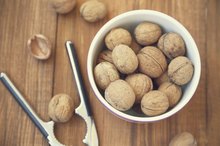The Benefits of Chewing Flaxseeds
Flaxseeds are a popular addition to baked goods and cereals as they enhance nutritional value. But according to registered nutritionist Joey Shulman in her book, "The Natural Makeover Diet," the outer husks of flaxseeds are very hard to crack simply by chewing them, so it is preferred to grind them in a food processor or coffee grinder before consuming them in order to obtain their nutritional benefits 1.
Identification
Flaxseeds are a tiny, brown or golden seed known for their high omega-3 fatty acid content, unusual for a plant food. They also contain high levels of lignans, according to Janet Brill, PhD in her book, "Cholesterol Down," which are important for lowering cholesterol and basic heart health 2. Flaxseeds, most often found packaged or in bulk in health food stores, must be ground in order to obtain their health benefits.
Benefits
Benefits of Ground Flaxseed
Learn More
There are many benefits linked to flaxseeds once they are ground. Shulman notes benefits including reduced cholesterol and help with constipation. Improved skin quality and texture has also been linked to flaxseeds. Although they are a good source of omega-3 fatty acids, they provide EPA, which has to be converted to DHA in the body for benefits including increased brain function, reduced inflammation and lowered depression. Therefore, while flaxseeds may provide some of these benefits, the DHA in fish oil has been shown to be absorbed and used more easily by the body.
- There are many benefits linked to flaxseeds once they are ground.
- Therefore, while flaxseeds may provide some of these benefits, the DHA in fish oil has been shown to be absorbed and used more easily by the body.
Evidence
According to editor Lilian U. Thompson in her book, "Flaxseed in Human Nutrition," the contribution of whole flax seeds to the nutrient intake of humans is not known because no clinical studies of their digestibility has been conducted 3. It is generally accepted that whole seeds pass through the body undigested due to their resilient seed coat and the fact that many people do not thoroughly chew their food. Grinding seeds before consuming adds nutritional value.
Considerations
Does Flaxseed Contain Soluble or Insoluble Fiber?
Learn More
Flaxseeds should not be used as a main source of reducing cholesterol, preventing heart disease or reducing inflammation. Flaxseeds are a healthy part of a diet that may help in preventing or healing certain ailments, but should only be eaten in conjunction and where appropriate with medication your doctor prescribes. Be sure to purchase flaxseed that has been refrigerated so that its volatile oils have been protected and the seeds have not gone rancid.
- Flaxseeds should not be used as a main source of reducing cholesterol, preventing heart disease or reducing inflammation.
- Flaxseeds are a healthy part of a diet that may help in preventing or healing certain ailments, but should only be eaten in conjunction and where appropriate with medication your doctor prescribes.
Related Articles
References
- "Natural Makeover Diet"; Joey Shulman, DC; 2005
- "Cholesterol Down"; Janet Brill, PhD; 2006
- "Flaxseed in Human Nutrition"; Lilian U. Thompson; 2003
- Mccann SE, Thompson LU, Nie J, et al. Dietary lignan intakes in relation to survival among women with breast cancer: the Western New York Exposures and Breast Cancer (WEB) Study. Breast Cancer Res Treat. 2010;122(1):229-35. doi:10.1007/s10549-009-0681-x
- National Center for Complementary and Alternative Medicine, National Institutes of Health. Flaxseed and flaxseed oil. Updated November 30. 2016
- Oncology Nutrition DPG. Flaxseeds and breast cancer. Updated January 2014.
- National Center for Complementary and Alternative Medicine. Clinical Trials. Macrobiotic Diet and Flax Seed: Effects on Estrogens, Phytoestrogens, & Fibrinolytic Factors. Completed in August 17, 2006.
- Liu K, Lu C. Gut microbes modulate host response to immune checkpoint cancer immunotherapy. Translational Cancer Research. 2018. 7(Suppl 5):S608-S610. doi:10.21037/tcr.2018.05.37
Writer Bio
Christine Garvin is a certified nutrition educator and holds a Master of Arts in holistic health education. She is co-editor of Brave New Traveler and founder/editor of Living Holistically... with a sense of humor. When she is not out traveling the world, she is busy writing, doing yoga and performing hip-hop and bhangra.









